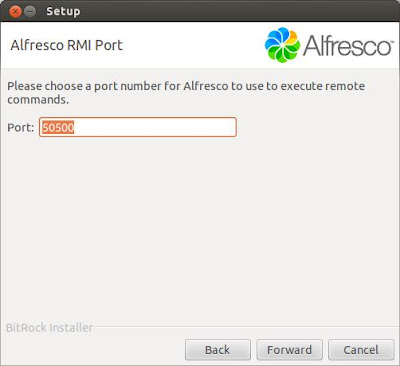Update: A more recent post discusses deploying Alfresco 5.0 Community Edition on Ubuntu 13.10
In this post, I want to write about downloading and installing Alfresco, an Open Source Enterprise Content Management System.
In this post, I want to write about downloading and installing Alfresco, an Open Source Enterprise Content Management System.
From the primary site, I navigated to
url http://wiki.alfresco.com/wiki/Download_And_Install_Alfresco
to see available installers for the Community Edition of the
software.
Clicking on the second link for Linux
installer, brought the following page.
Clicking on the Download Now link,
started downloading the installer on my Downloads folder. The
download was a large file. As download began, it gave a link to join
the alfresco community, which I did.
Once download was complete, I closed
the browser to proceed. To install, move the installer to a target
folder from the downloads folder.
Next, we need to make the installer
executable
$ chmod a+x *.bin
Now, we need to run the installer by
issuing the following command
$
./alfresco-community-4.2.c-installer-linux-x64.bin
This brings the dialog box for default
language
Next screen, informs that we are
setting up the community edition of the software
Clicked on forward gives the following
screen. Since, I knew I would have to modify the port entries, I selected the Advanced option to change default ports and other settings.
On the next screen, I checked off the
software components that I already had on my machine (Java,
PostgreSQL, LibreOffice) and turned off the components I did not need
(SharePoint). Ended up making the following selections
In the next screen, we select the
installation folder. I updated the default location to something of
my preference.
I wanted to deploy the software against
PostgreSQL, which is the option it gave me. I created a user called
alfresco and a database called alfresco with the following commands.
$ su - postgres
postgres$ psql -d template1
psql > create user alfresco with
password 'alfresco';
psql > create database alfresco;
psql > grant all on database
alfresco to alfresco;
With the database created, I can resume
the installation to go to the next screen that prompts to enter the
database connection values.
The next screen displays the ports to
be setup. I checked my open ports using appropriate tools. I have
posted on the way to check available
ports here. Based on the results, I modified the default port
entries as follows:
Next the installation prompted for a
ftp port setting. I left it as default.
Next the installer prompted for the RMI
port for remote invocation. I again left it as default.
Finally, the installer asks the
installer to specify a password for the admin user. I kept it as
“alfresco”.
Clicking on Forward brought a prompt
indicating the setup was ready as shown below.
Clicking on the Forward button, starts
the installation. It takes a while after setting up the files for the
installation to complete.
After the installation is complete, the
following prompt is shown.
Next, I launched a browser and accessed
the location (http://ub1204.arthgallo.com:8083/alfresco)
on my browser.
The application took some time as the
initial tables were setup in the database repository and finally the
Alfresco site was displayed on the browser.
In this post, we saw how to setup
Alfresco Community Edition, an Enterprise Content Management software
on an Ubuntu 12.04 machine.






















No comments:
Post a Comment